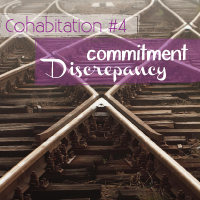Cohabitation #4: Commitment Discrepancy

Although cohabitation is now the norm, research demonstrates that this practice is counter-productive in its impact on the future marriage. Rather than enhancing it, cohabitation subtly undermines it.
There are diverse reasons for couples choosing to live together. Some are already engaged to be married. Others are in committed relationships and see it as a natural progression of the dating-courtship sequence. Still others live together to simply save money on rent. Some have no intention of marrying and view cohabitation as a permanent alternative to marriage.
As cohabitation has so many different forms and end points, it is common for there to be differences in the expectations and level of commitment of the partners. One partner may see moving in together as a way progressing the relationship ‘to the next level’ while the other sees it as a ‘friends with benefits’ arrangement while he/she keeps their options open for a possible better partner.
Research has shown that women more typically view cohabitation as a precursor to marriage while men more often view it as a way of enjoying the benefits of a live-in partner without being locked down to a specific partner for life. These differences are called ‘commitment discrepancy’. It means that the power in the relationship is unequally distributed with one partner being subject to the whims of the other. Such a situation almost always leads to confusion, hurt and tension that persist well beyond the cohabitation stage.






